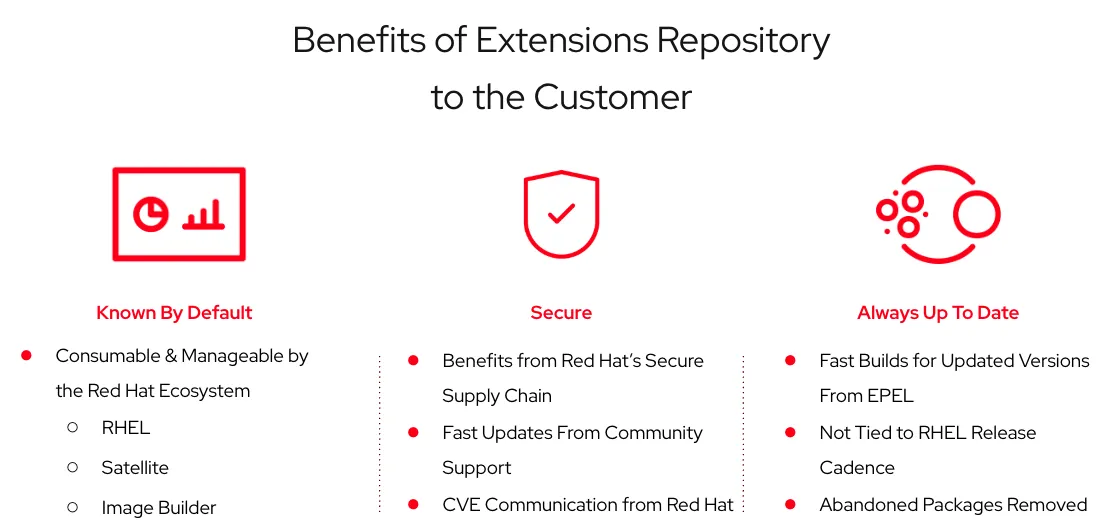More. We’ll never stop wanting it. The number of applications and their dependencies that require management is continuously growing. Starting now, the Red Hat Enterprise Linux (RHEL) extensions repository addresses the evolving needs of RHEL users by providing a trusted and reliable source of validated software content. Using the RHEL extensions repository, you can keep up with the speed of innovation without compromising security.
What is the RHEL extensions repository and should I enable it?
The RHEL extensions repository is a collection of software, curated by Red Hat, that includes developer tools, open source libraries, and niche utilities. Its primary goal is to deliver high-value, fast-moving software through Red Hat's secure supply chain. This means you get access to software that's up to date, and built and signed by Red Hat.
The RHEL extensions repository is available starting with RHEL 10, and is coming soon to RHEL 9. Initially, we've hand-picked popular content from Extra Packages for Enterprise Linux (EPEL), and we'll be evaluating additional sources of content in the future. If you've found yourself wanting to use content from EPEL but you've been unable to do so for compliance reasons, extensions is meant for you.
Key benefits of the RHEL extensions repository
The RHEL extensions repository offers several significant advantages:
- Red Hat's secure supply chain: Every piece of content in extensions is built and signed by Red Hat. With CVE communication from Red Hat, you can trust that the software you're using is safe and dependable.
- Always up to date: Access the latest versions of software quickly, without waiting for the regular RHEL release cycle. There's no wading through abandoned packages in search of something properly maintained, and you get the newest features and improvements as soon as they're available upstream.
- Known by default: Extensions is not enabled by default, but integrates easily with the existing RHEL ecosystem, including RHEL, Red Hat Satellite, and Image Builder. This makes adopting and using the new software effortless.
- Community support: Benefit from the contributions and rapid enhancements driven by the community, so the software is continually improving and evolving.

This is just the beginning
We still want more in RHEL. We'll never stop wanting it. This is true, whether you're an end-user of RHEL, a partner building solutions with RHEL, or an upstream developer of the next great Linux tool. The RHEL team has always been eager to listen to your requests for more, even if we've had to say "no" to those requests in the past. With the RHEL extensions repository, we hope to be saying "yes" a lot more in the future, so keep those requests for more coming!
product trial
Red Hat Enterprise Linux Server | Essai de produit
À propos de l'auteur
Bronce McClain is a senior product manager focused on making Red Hat Enterprise Linux (RHEL) the default choice in the public cloud. He joined Red Hat in 2012 and has been a part of the RHEL business unit since 2017. Prior to his focus on RHEL, he worked with the Red Hat Virtualization (RHV) team.
Contenu similaire
Parcourir par canal
Automatisation
Les dernières nouveautés en matière d'automatisation informatique pour les technologies, les équipes et les environnements
Intelligence artificielle
Actualité sur les plateformes qui permettent aux clients d'exécuter des charges de travail d'IA sur tout type d'environnement
Cloud hybride ouvert
Découvrez comment créer un avenir flexible grâce au cloud hybride
Sécurité
Les dernières actualités sur la façon dont nous réduisons les risques dans tous les environnements et technologies
Edge computing
Actualité sur les plateformes qui simplifient les opérations en périphérie
Infrastructure
Les dernières nouveautés sur la plateforme Linux d'entreprise leader au monde
Applications
À l’intérieur de nos solutions aux défis d’application les plus difficiles
Virtualisation
L'avenir de la virtualisation d'entreprise pour vos charges de travail sur site ou sur le cloud
